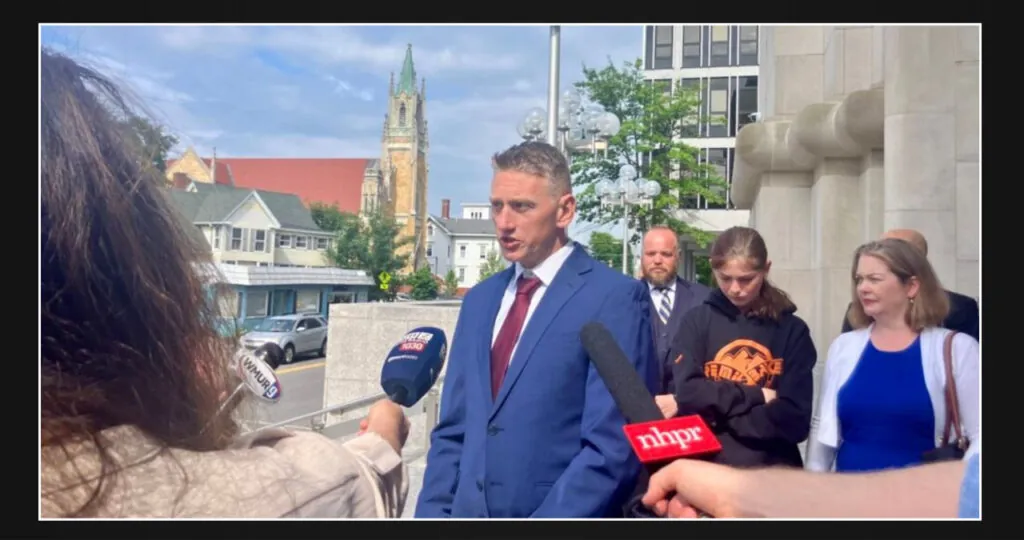A New Hampshire teenager has received temporary relief after a federal judge blocked the state law preventing transgender girls from participating in girls’ sports. This decision comes just one day after the law went into effect.
Judge Landya McCafferty, from the U.S. District Court of New Hampshire, rendered a ruling on Monday that prevents both the state and any school district from barring Parker Tirrell, a 15-year-old, from taking part in practices or games for the Plymouth Regional High School girls’ soccer team. This ruling will remain in effect until the court reconvenes in a few weeks.
Tirrell’s participation in her soccer team’s practice on Monday evening has been permitted by the ruling.
According to McCafferty, Parker has shown a high likelihood of success in her case. McCafferty’s ruling, however, is specific to Tirrell and does not apply to all student athletes. The plaintiffs in the case are seeking a more comprehensive ruling in the near future that would temporarily halt the law for all student athletes.
Tirrell, a transgender girl, received news from the Pemi-Baker Regional School District last week that she would be unable to participate in soccer practice on Monday evening. The school district justified its decision based on a recently enacted law, House Bill 1205, which prohibits students in grades 5 to 12 who were assigned male at birth from joining girls’ sports teams, regardless of their transgender identity. This law, which came into effect on Sunday, grants parents the right to sue a school district if it fails to comply with the legislation and enforce the ban.
Republicans argue that the law is essential to maintain fairness in sports, as transgender girls are believed to have an advantage over cisgender girls. On the other hand, Democrats and LGBTQ supporters claim that the law is discriminatory and will exclude transgender girls who prefer to compete on girls’ teams from participating in sports.
The GLBTQ Legal Advocates & Defenders (GLAD) and the American Civil Liberties Union of New Hampshire have filed a lawsuit against the state on behalf of two transgender girls, Tirrell and Iris Turmelle. Their lawyers argue that the law is in violation of the equal protection clauses of the U.S. Constitution and Title IX, the anti-sex-discrimination statute.
The plaintiffs appeared before McCafferty on Monday for an urgent hearing. The hearing was prompted by the fact that Tirrell had soccer practice scheduled for that evening but was told she couldn’t participate. Turmelle, a Pembroke student, is not planning to join a sports team until the winter, so emergency legal action was not requested for her.
Plaintiffs have filed a request for a “temporary restraining order” against the law. This type of relief is sought when it is believed that the plaintiff has a strong chance of winning the case. Additionally, the plaintiff must demonstrate that they would suffer irreversible damage if the order is not granted. Moreover, the court must determine that ruling in favor of the plaintiff is the fairest outcome for all parties involved, and that it serves the public interest.
According to Chris Erchull, an attorney for GLAD, it was argued before McCafferty that if Tirell were prohibited from participating in sports, she would face irreparable harm in the form of discrimination and the potential for shame and stigma from her peers.
In response to the request for an injunction, Michael DeGrandis, an attorney representing the New Hampshire Attorney General’s Office, challenged the notion that being prohibited from attending soccer practice would result in irreparable harm.
He acknowledged that missing sports practice can be stressful and straining. However, he questioned whether it truly causes irreparable harm.
According to him, the purpose of HB 1205, the underlying law, is to safeguard the rights of girls and women, in line with Title IX, rather than infringing upon them.
During a brief oral argument, McCafferty showed doubt in that stance and questioned DeGrandis about how the law would protect girls’ rights. She asked DeGrandis to clarify how it would serve that purpose specifically in Parker’s case.
DeGrandis argued that the law was not intended to be universally applicable in every situation, and therefore, its potential differential treatment of certain students does not render it unconstitutional. According to him, Parker’s unique circumstances should not be a determining factor in the application of the law.
Erchull, on the other hand, pointed out that Tirrell and Turmelle had undergone hormone therapy, which effectively nullified any potential physical advantage they may have had previously.
During the court proceedings, he confidently asserted that girls with disabilities would not possess any exceptional speed or strength compared to their typical counterparts.
McCafferty concurred, acknowledging the undeniable fact that Tirrell’s participation in sports is not associated with any physiological advantage. This is due to the hormone therapy Tirrell has undergone, which effectively neutralizes any potential biological advantage she may have possessed previously.
The ruling marks the beginning of a potentially lengthy legal journey that may ultimately reach the U.S. Supreme Court.
Plaintiffs’ attorneys have stated their intention to seek a temporary injunction in the upcoming hearing, which is anticipated to take place within weeks. If granted, this injunction would provide a more enduring halt, effectively preventing the law from affecting any students while the lawsuit is being deliberated by the U.S. District Court.
